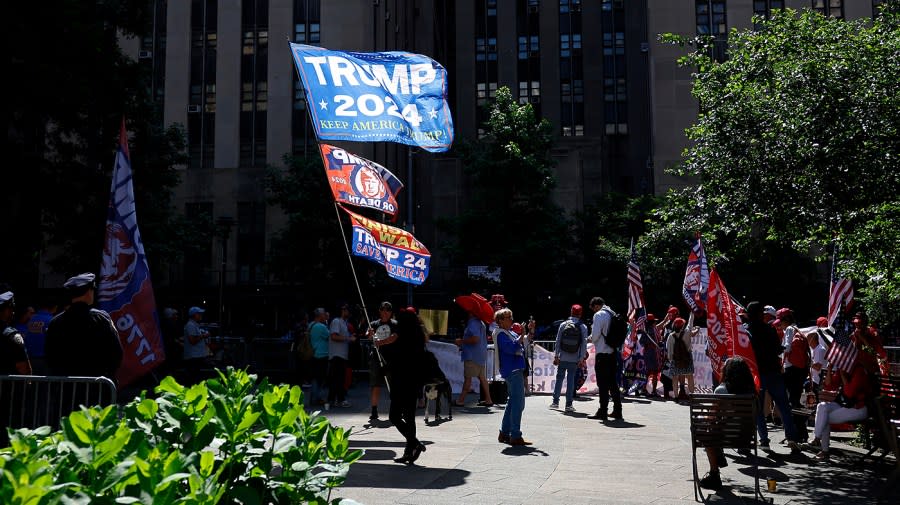The Memo: What happens if Trump trial ends in hung jury?

The jury in former President Trump’s New York trial completed its first day of deliberations Wednesday without reaching a verdict.
If that indecision continues for several days, it will open up one of the more politically intriguing scenarios. A hung jury, and a declaration of a mistrial, would become a real possibility.
The political contours are fairly clear if Trump is either convicted or acquitted. The former verdict would hand President Biden a powerful piece of ammunition in this year’s election, and the latter would put new wind into Trump’s sails.
The electoral ramifications of a hung jury are harder to game out.
Republican and Democratic observers agree that Trump would claim victory in the event of the jury being unable to come to a verdict.
GOP strategist Alex Conant argued that a hung jury would, politically speaking, have much the same impact as an acquittal.
Either scenario would amount to Trump “escaping a guilty verdict” and would “energize” the former president’s base, Conant said.
“From the Republicans’ perspective, it would mean that the liberals tried everything they could to put Trump in jail and he beat them.”
For Democrats, there is widespread skepticism that a hung jury would have much political impact at all.
They are keenly aware of how little the election-related opinion polls have shifted during the trial, and they tend to see even the more lurid allegations regarding Trump and adult film actor Stormy Daniels as having little new impact on voters.
“Views of the former president are pretty baked in,” said Democratic strategist Julie Roginsky. “If you think that he is a crook who has broken laws, there are plenty of other court cases to prove that point. If you think he is being unfairly prosecuted — or ‘persecuted’ as [Trump’s] supporters would see it — there are plenty of cases you can point to there too.”
The one person whose life would be significantly complicated by a hung jury would be Manhattan District Attorney Alvin Bragg (D). A mistrial would mean that he would then have to decide whether to mount a second trial.
Bragg faced some second-guessing, even from Trump critics, when in April 2023 he became the first prosecutor to indict the former president. The New York case is widely seen as the least serious of the four Trump faces — and as the one where the prosecution has the weakest argument.
Even if Bragg decided a second trial was worthwhile in the event of a hung jury, such a showdown would likely not happen before the 2024 election.
Prosecutors decided against pursuing a second trial in an old political case that has some parallels with the Trump-Daniels matter.
Back in 2012, former Sen. John Edwards (D-N.C.) was prosecuted in a case centered on money that had been paid by his allies to support a woman with whom he had an affair, and with whom he had fathered a child.
Prosecutors argued the payments were illegal campaign contributions because, at the time, Edwards was a candidate in the 2008 Democratic presidential primary, ultimately won by former President Obama.
Edwards faced six counts. The jury acquitted him of one and deadlocked on the remaining five. Soon after, the Justice Department announced it would drop the case.
In Trump’s New York case, a conviction or an acquittal requires unanimity among the 12 jurors.
There is no rigorous deadline for the jury to reach a verdict. But it can safely be assumed the 12 New Yorkers have some eagerness to complete their duties and get back to their normal lives, given that the trial began in mid-April.
Trump faces 34 felony counts of falsifying business records. The case revolves around a $130,000 hush money payment made to Daniels in the final days of the 2016 presidential campaign.
If jurors fail to reach a verdict after several days and tell Judge Juan Merchan they are not making progress, Merchan could resort to a method known as an “Allen charge.” Legalese aside, this mechanism basically amounts to a plea from the judge for jurors to try harder to reach a verdict. It does not weaken the requirement for unanimity.
If there was still no sign of a 12-0 verdict one way or another, Merchan would have no choice but to declare a mistrial. It is possible the jury could reach a decision on some of the 34 charges and deadlock on others — though most of the 34 counts are fairly similar.
Opinions on the Trump case split along starkly partisan lines.
An Economist/YouGov poll this week asked whether people viewed the investigations in the Trump hush money case as fair or unfair.
Among Democrats, 78 percent saw the probe as fair. Among Republicans, 72 percent saw it as unfair. Independents were split three ways, almost evenly: 36 percent fair, 32 percent unfair and 32 percent unsure.
Democratic strategist Mark Longabaugh said he believed that the election would ultimately be decided by political, rather than legal, factors — including each candidate’s performance in the upcoming debates, the first of which is set for June 27.
“There are a lot of political events yet to play out,” Longabaugh said. “At the end of the day — sad as it may be — this trial won’t change the equation from where we are.”
The Memo is a reported column by Niall Stanage.
Copyright 2024 Nexstar Media, Inc. All rights reserved. This material may not be published, broadcast, rewritten, or redistributed.
For the latest news, weather, sports, and streaming video, head to The Hill.


